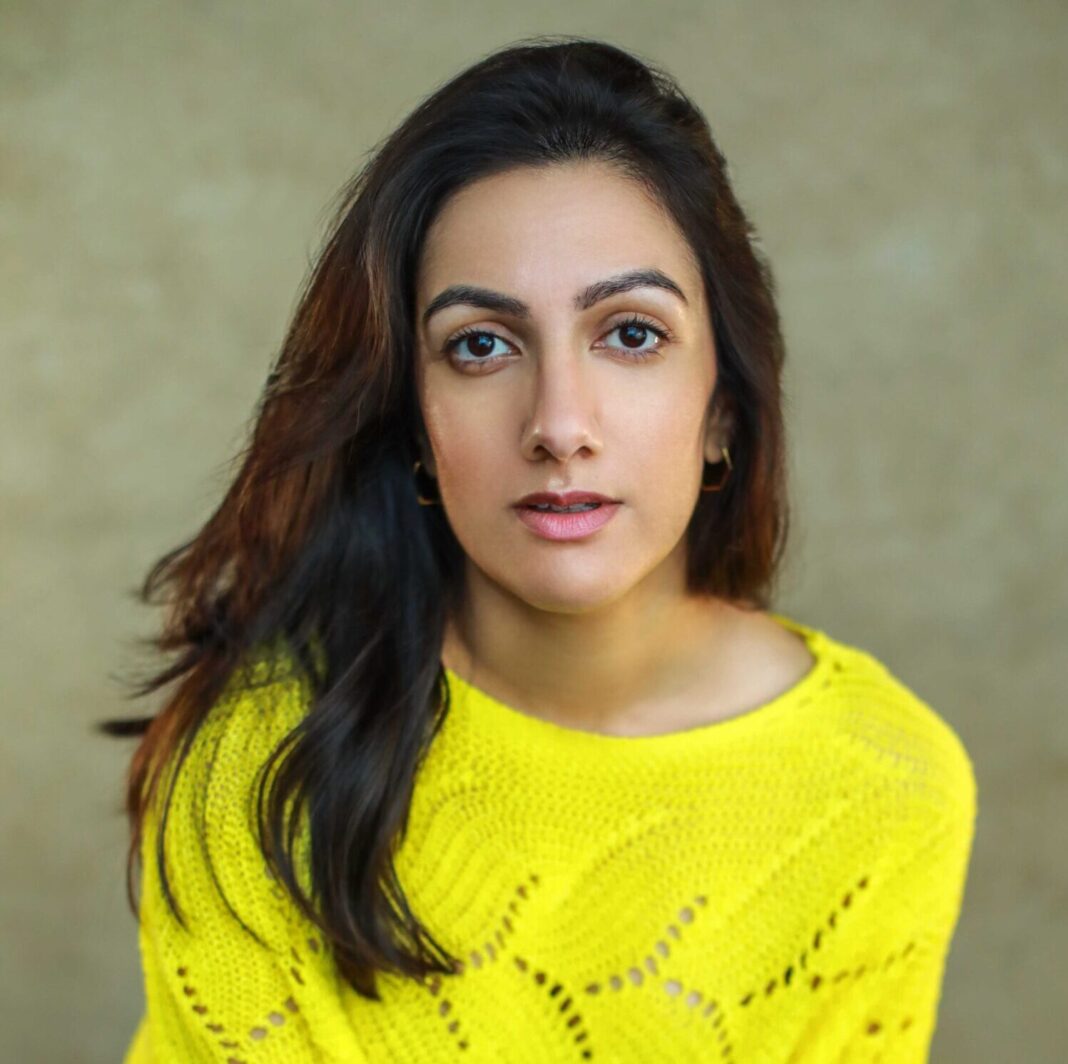Click here to read Noor’s review of Saher’s play Vitamin D.
EDITOR’S NOTE: This article has been edited to make it more concise and understandable.
How did you get into playwriting and acting?
I have that age-old story that a lot of South Asian girls (or girls from any sort of diaspora that’s not from white Britain might have): I wanted to be an actor and a writer since I was like 11. My parents and I never fought about it, but my mom was just like, “No, beta, that’s not going to happen.” So, I was like, “Okay, fine, let’s not fight about it because I might not be that good.” Even though my teachers might say that I’m really good at it, and it’s the best subject that I perform in, it’s not what Pakistani Muslim girls do, so maybe I shouldn’t do it. I just kept that alive in my heart until A-level because I took Drama to A-level and then I left it behind.
And then, I won’t go into details about my career that I chose afterwards, but I went through sciences because you know, that’s what you’re “supposed” to do. And then, I became a Dietitian and worked in the NHS for 7-8 years, and it still really pained me watching things that I liked. So, if I went to a play or if I went to a musical or if I watched a show that really touched me in a particular way, I would love it, but I would also get quite pained as well that I wasn’t part of that universe.
So, then I decided, I’m in my late 20s, I’m just gonna give it a shot. Let’s just see what happens. I’ve built a career now around something that’s not around creative industries, I’m sure my parents will be fine about it now, and they are, so then I gave it a shot and started acting classes again. I always used to write, so any devising pieces at school during A-levels and GCSE normally, I would write. I used to write a lot of the comedy and a lot of the drama as well.
What were some of the challenges that came with entering the industry at a later stage in life?
Without having been to drama school, or having an agent, or really knowing anyone in this industry at all, it was a bit harder to get role – not to say it’s not harder now – it still is, even though I have a lot of those things now. But having access to a lot of roles was through open calls, and open calls are great. I still get great work through open calls, and some great work goes through open calls – Vitamin D went through open calls as well. But very few and far between are things that are written for a Brown woman from a Muslim background who looks like me and sounds like me, that are done with dignity and respect, and some of the things that I saw that were out there were just frankly offensive. So, I thought, “if this is getting made, surely I can write myself a complex, nuanced, layered role for a British Pakistani Muslim woman that’s done with dignity and respect.” And so, I just wrote myself a lead role because no one else is going to give me one, and then a whole bunch of other roles for other women that look like me as well.
It sounds like it was a seed inside of you for many years.
My whole family is very creative, even though I was discouraged from taking it on as a job when I was a child. We’re not a sporty family. We don’t run very fast, and we don’t do other extracurricular activities that are really great, but we’re all really arty. Noor, obviously you came to the show. You saw how much influence music had in the show. That comes from my parents. I learned about Qawwali from a young age because it’d be blaring in our house on a Sunday morning. My sister and my brother taught me about 80’s music. I learned about Queen and US rap from the 80s from them. My mom sings, and she plays the dholki, so all around me is all this creativity. It’s been in me forever, and I only let it out about four years ago.
How did you come up with the play’s title Vitamin D?
I have a Spotify playlist that I’ve made that is like the inspiration for when I wrote the show or when I’ve been creating the show, along with the rest of my creative team. And on that is a mixture of a lot of what you hear in the show as well. So, there is Qawwali, there’s Bhangra, but there’s Hip Hop, there’s Garage, there’s Grime, Soca – these are all the influences of that world that Larki lives in because that’s the representation of the musical world that raised her in the UK. One of the songs on the playlist, that didn’t actually make it into this rendition, is called Vitamin S by Baby Cham. And I was dancing around to that while I was writing the play. And then I was like, ‘oh, what if I called it Vitamin D’ because exactly like you said, it’s a play on the word divorce but also how we see divorce.
Divorces in the South Asian community are seen as a bad thing. We shouldn’t be having divorce in our community. It is seen as a failure, mostly on the woman’s part usually, and as something we don’t need more of, whereas vitamins are something that we sometimes do need more of, or we usually don’t know what we’re deficient in. We’ll go to the doctor, we’ll do a blood test and the doctor says, “by the way, the reason you’re not feeling well, is because you’re deficient in something, so you need to replenish that.” And then once you have it, it nourishes you, makes you feel good.
So, what if we saw divorce as something that was nourishing and that made you feel good because obviously, the marriage you were in was not good for you, for whatever reason, not necessarily that they’re all toxic, but it had to end to make yourself feel good and to nourish you? Surely that’s the way we should look at divorce rather than looking at it as a thing that we shouldn’t talk about, anything that we shouldn’t do.
And then it’s like a play on melanated women – Black and Brown women. We need more Vitamin D while we’re living in the UK because it’s so grey, and our skin is not made for that.
How can one handle the negative stigma associated with being divorced?
Everyone’s different, right? Learning about yourself, because that’s what Larki’s doing. She’s learning about what she wants and what she likes and what she dislikes. In this case we are talking about divorce but this is regardless of divorce as well. When someone goes through an emotional crisis, people will try and comfort you. Like in that scene in Vitamin D at the dholki, when the aunty says, “Don’t worry, beti, you can sit in the back. No one will talk to you,” she’s genuinely trying to help. She’s not trying to be horrible. And actually, in the beginning of that scene, sitting at the back is what Larki is trying to do. But by that aunty making a spectacle about it and saying it out loud in front of other people, it makes the situation not very nice. So, a lot of people are doing things to make themselves feel better. She didn’t actually do that for Larki, she did that for herself.
I think learning about how other people want to deal with something that they’re going through for their benefit. So even if you want to talk about it, but the person experiencing that emotional crisis says, “Actually, right now I really just want to sit in silence,” respect that. So for women who may be going through divorce, I think it’s really good to learn your own boundaries and being able to communicate that. So, when someone’s about to cross the boundaries that you want to create in a conversation, you can say, “Actually, I don’t really want to engage in this because it’s not healthy for me. I know you need this, but I don’t. It’s actually not very helpful for me. So, I’d like to cease this here.'”
What would you say is the primary message conveyed by the production?
There’s a lot of messages. As a writer, you really need to make sure that you don’t bank on certain things that audiences are going to take away from your writing because people are going to walk away and think things that you didn’t intend them to, and maybe you don’t even want them to be, and you can’t control that. But I think, regardless of whether you’re British South Asian, Black, East Asian, or white, I’d like for people to come out and reflect on themselves and think about how maybe we can be better to ourselves and to others. No one’s born woke, right?
What would you like to say to those girls who are going through what Larki went through?
You do you, sis. If they’re not gonna talk about you, they’re gonna talk about somebody else. They’re gonna talk about you regardless, even if you marry someone from the same culture, the same particular area of a country from three generations ago, who has the same degree as you, same level of job or whatever, there will be something they will talk about. That’s just how humans are. So just do whatever you want, as long as you’re not hurting anybody. Just live your life as you want.
What is the future looking like for Vitamin D and for yourself?
It’s all about funding. I’d love for it to have a home in a theatre for a minimum one to three weeks so that we could have a home to settle in. Touring is hard. Touring is so important because it gets a show into places where it should be. But I think it’d be really nice for the show and for the team for us to be able to sit in our home for a couple of weeks and really explore the show in that home. So, not having to change the entrance and exits every time we move in a venue.
And for me, honestly, as a creative, you just keep hustling. You keep applying for things, you keep writing stuff, you keep talking to your agent to get you acting jobs. You really have no idea. I’ve made a rough plan of “I want to make this as my next show” or I’m writing on this programme or that programme, and I’m developing these pieces of work or these are the types of things that I want to do as an actor, but a lot of that isn’t in your control. So, BAFTA before I’m 40. That’s where I want to be!












